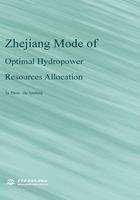
Foreword
In every stage of economic development,our government attaches great importance to the exploitation of hydropower resources.Hydropower development has successfully played different roles in different economic stages.Hydropower resources have been utilized for rural power supply to develop the local economy and protect ecological environment as well.The same hydropower resource site and rural hydro plant have played multiple roles in different stages.In the 21st century,in addition to attaching importance to domestic resource development,China has taken the development of hydropower resources as an important way of international cooperation,setting a good example to the other countries over the world in hydropower utilization and rural hydro development.A lot of experience has been accumulated in developing hydropower resources over the countries in terms of engineering technology,investment model,three-compensation mechanism,efficiency improvement and capacity expansion,grid connection and feed-in tariff,resettlement and poverty alleviation policy,etc.For instance,Zhejiang,as a pilot province,has implemented the China Renewable Energy Scale-up Program financed by the World Bank and the rehabilitation and upgrading project subsidized by the Global Environment Fund.It also participates in the international small hydropower cooperation by promoting the hydropower development mode via Today’s Hydropower Forum and the Forum on South-South Cooperation.In particular,since President Xi Jinping and Mr.Schelf,former Prime Minister of Pakistan,jointly unveiled the China-Pakistan National Joint Research Center for small Hydropower Technology,hydropower resources development has become a key part of the cooperation among the Belt and Road countries,and the number of related international cooperation projects is increasing rapidly.
“Lucid waters and lush mountains are invaluable assets”,which is the historical orientation of the current hydropower resources development in China.The exploitation of hydropower resources and the development of rural hydropower have reduced deforestation and protected the clean water and green mountains.It has also enabled farmers to learn how to invest and operate their capital,promoting the transformation and upgrading of the economy in the remote rural areas.In keeping pace with the times,various missions have been taken on by hydropower resources and rural hydro development,such as rural infrastructure construction,economic development,clean and renewable energy resources exploitation,constantly excavating the potential economic and social values and endowing them with new connotations.
The author has long studied the allocation of hydropower resources and rural hydropower technology,especially the green hydropower technology.The book Zhejiang Mode of Optimal Hydropower Resources Allocation is the integration of research results over the years,providing a lot of case studies fully illustrating the technical factors featuring the different stages of development and affecting the allocation efficiency.The main contents of this book include:
(1)Aiming at the research of optimal allocation of hydropower resources and combining the modern market-oriented allocation mode with incentive compatible system arrangement,the ways of paid use of hydropower resources are explored.
(2)By establishing the property right system of hydropower resources,the ownership in the utilization of hydropower resources is clarified,and the resource compensation mechanism for the exploitation of hydropower resources is also put forward.
(3)By analyzing the externalities in hydropower resources development and exploring corresponding approaches of internalizing these externalities,the economic compensation mechanism of hydropower resources is constructed.
(4)Based on the study of the impact of hydropower resources development on river basin ecosystem,the evaluation method of ecosystem and ecological compensation technology are established,and the ecological compensation mechanism of hydro-energy resources is put forward.
(5)An integrated solution is reached,putting forwarding the efficiency target of hydropower resource allocation under the goal of sustainable development,and a technical framework of hydropower resources development compensation is established at the micro,meso,macro and super macro levels.
This book can not be completed without the care and help of my colleagues and those experts.My thanks are given to Zhou Ming,Wang Xinliang,Bai Fuqing,Wang Shiwu,GE Handong,Zhou Weibin,Yao Yuelai,Chen Xiaojian,Zhang Renshu,Zhang Weilin,Chen Yongquan,Shao Jianliang,Ma Axiang,Zhao Xinyong,Wang Guansen,Zheng Jin,Wu Wenmei,Li Xiaoming,Chen Wenfei and other experts on hydropower resources development and rural hydropower technology for providing useful information and cases in the writing of the book.Thanks also go to Xing Yuanyue and Liu Zhongmin,Deputy Directors of Hydropower Bureau of Ministry of Water Resources;Cheng Xialei,Director International Center on Small Hydro Power;Xu Jincai,Director of Rural Electrification Research Institute of Ministry of Water Resources for their strong supports.In particular,I would like to thank Professor Wang Xinliang for his extensive and meticulous work in the publication of the book.My gratitude also goes to those whom I can not name one by one and whom I will always keep in mind for their help and support.The book is also supported by Zhejiang Provincial Philosophy and Social Science Program(Research on Theory and Practice of Optimal Allocation of Hydropower Resources,No.15NDJC237YB)and the Zhejiang Natural Science Foundation(Research on Regional Water Resources Allocation Model Based on Incentive Compatibility Theory,No.LY14G030023),thanks to them,too.
Authors of the book
December 2017